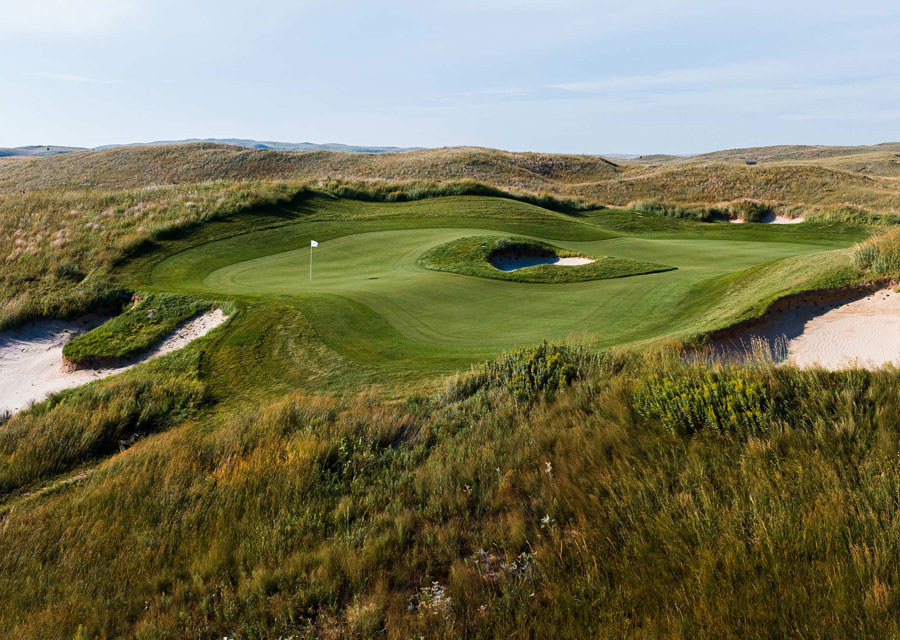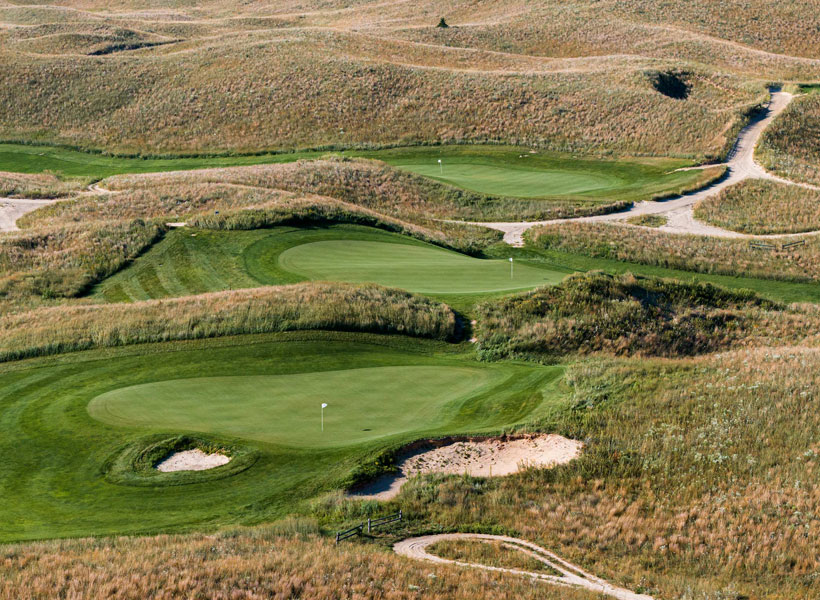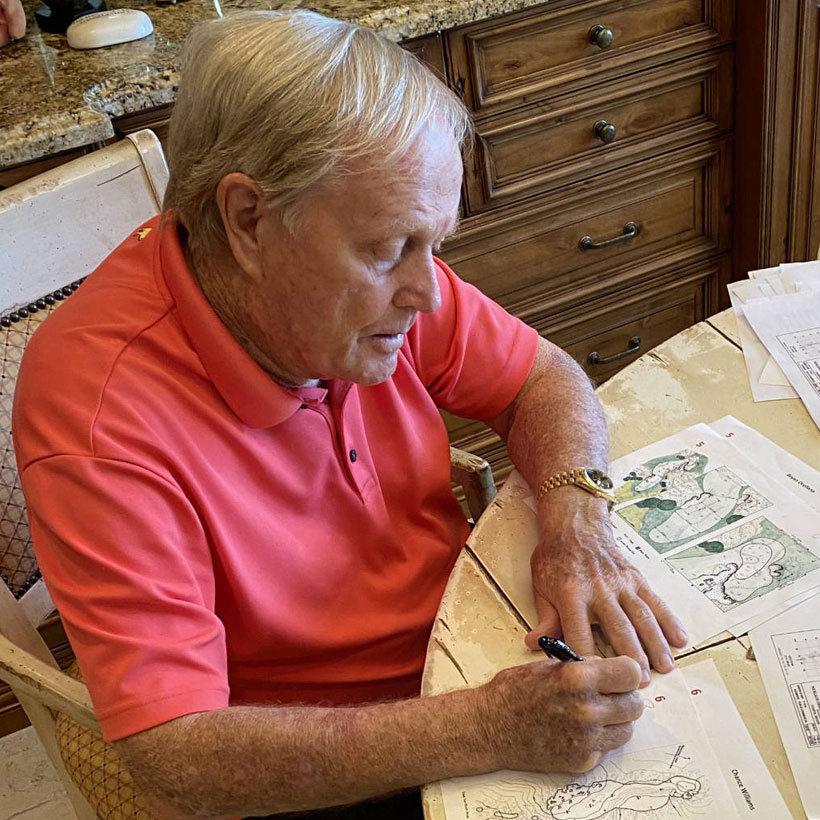Jack Nicklaus Design
It’s not an exaggeration to suggest the Golden Bear’s impact on golf as a designer may, in the final assessment, rival the impact of his playing career.

January 21, 1940, Columbus, Ohio
Nicklaus Design
Jack Nicklaus’s career as a professional golfer needs very little explanation. The Columbus, Ohio, native won a record 18 major championships and, perhaps even more impressively, finished runner-up an additional 19 times at majors. Nicklaus dominated his generation of golfers throughout his golfing life.
Toward the beginning of his reign as the world’s undisputed best player, Nicklaus started a side-line as a golf architect. Nicklaus advised up-and-coming architect Pete Dye on the Golf Club, near where Nicklaus grew up in Ohio (1967), before formally collaborating with Dye on Harbour Town Golf Links (1969). He also partnered with the outré English-American architect Desmond Muirhead, with whom Nicklaus collaborated on his most important and personal design, Muirfield Village Golf Club (1974). In the meantime, the Golden Bear formed his own architecture firm, Nicklaus Design.
Nicklaus’s first solo designs at Glen Abbey Golf Course (1976) and Shoal Creek Club (1977) were immediately awarded the Canadian Open and PGA Championship, respectively. These initial projects, along with Muirfield Village and Mississippi’s Annandale Golf Club (1981), set the tone for Nicklaus’s style: big, challenging, water-heavy, and capable of hosting professional championships. In the early 1980s, Nicklaus and his ever-growing team built architectural prototypes for Rocky Mountain golf at Castle Pines Golf Club (1981) and Arizona desert golf at Desert Highlands Golf Club (1983).
The rise of residential golf became integral to the story of Nicklaus Design, as developers around the world tried to attract interest in their real estate offerings by using one of golf’s biggest names. To name just a few of these from the middle period of Nicklaus’s career, his firm laid out two courses at the new Coachella Valley vacation development PGA West (1987), and another for the upscale Thousand Oaks community of Sherwood Country Club (1989). Nicklaus’s fame also earned the company spectacular oceanfront resort properties like Manele (1993) and the Ocean Course at Cabo del Sol (1994), as well as other opportunities at historic UK estate properties, such as Mount Juliet Estate in Ireland (1991) and the PGA Centenary course at the Gleneagles Hotel (1993).
While Nicklaus’s many courses of this period were rarely distinguishable from each other, his firm still did occasionally experiment. At Old Works Golf Course (1997), Nicklaus’s crew saved piles of furnace slag to create black sand bunkers. He also tried his hand at a naturalist Nebraska Sandhills layout at the White Course at Dismal River Golf Club (2006). Meanwhile, Nicklaus Design collaborated with other big names, like Tony Jacklin at Concession Golf Club (2006) and renowned neoclassicist Tom Doak at Sebonack Golf Club (2006).
Not to be underestimated is Nicklaus Design’s role as a leader in international golf architecture. In the first few decades of the company, the firm worked mostly in East Asia, namely Japan and Thailand. But as the company grew to be one of the largest in the industry, it began to debut many big-budget designs in other parts of the world, such as South Africa’s St. Francis Links (2006), New Zealand’s Kinloch Club (2007), Portugal’s Monte Rei Golf and Country Club (2007), and, more recently, Vietnam’s BRG Golden Sands (2024, with Jim Wagner).
Recently, Jack Nicklaus and Nicklaus Designs have become embroiled in a legal dispute, with the company, now owned by banker Howard Milstein, beginning to operate independently of its aging founder.
Designs attributed to Jack Nicklaus and Nicklaus Designs account for about one percent of the world’s golf courses. That’s an astonishing footprint, containing plenty of quality, though sometimes lacking imagination. So it’s not an exaggeration to say that Nicklaus’s impact on golf as a designer may, in the final assessment, rival the impact of his playing career.
Muirfield Village Golf Club
Dismal River Golf Club (White)
Concession Golf Club
Sebonack Golf Club
Castle Pines Golf Club
Desert Highlands Golf Club
PGA West
Sherwood Country Club
Harbour Town Golf Links
On Harbour Town’s flat, swampy, tree-choked property, Pete Dye managed to build 18 distinct holes that present a variety of strategic challenges and stick in the player’s memory
Harbour Town Golf Links
Dismal River Club (White Course)
An ambitious new build following the meteoric rise of Sand Hills Golf Club, Nicklaus’s White Course at Dismal River Club is the closest thing to playing golf on Mars
Dismal River Club (White Course)


Leave a comment or start a discussion
Engage in our content with thousands of other Fried Egg Golf Members
Engage in our content with thousands of other Fried Egg Golf Club Members
Get full access to exclusive benefits from Fried Egg Golf
- Member-only content
- Community discussions forums
- Member-only experiences and early access to events













Leave a comment or start a discussion
Lorem ipsum dolor sit amet, consectetur adipiscing elit. Suspendisse varius enim in eros elementum tristique. Duis cursus, mi quis viverra ornare, eros dolor interdum nulla, ut commodo diam libero vitae erat. Aenean faucibus nibh et justo cursus id rutrum lorem imperdiet. Nunc ut sem vitae risus tristique posuere. uis cursus, mi quis viverra ornare, eros dolor interdum nulla, ut commodo diam libero vitae erat. Aenean faucibus nibh et justo cursus id rutrum lorem imperdiet. Nunc ut sem vitae risus tristique posuere.